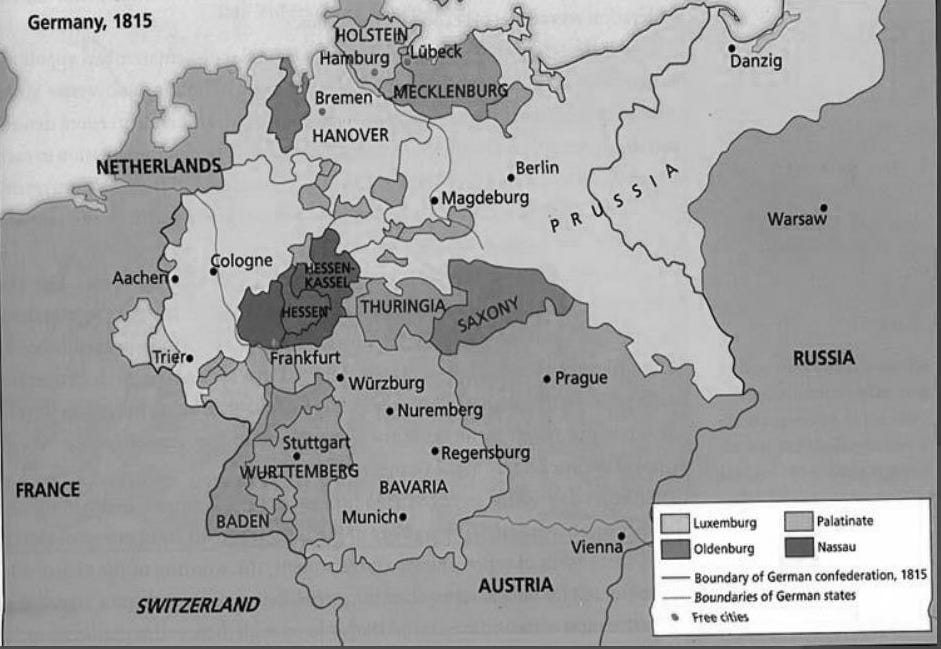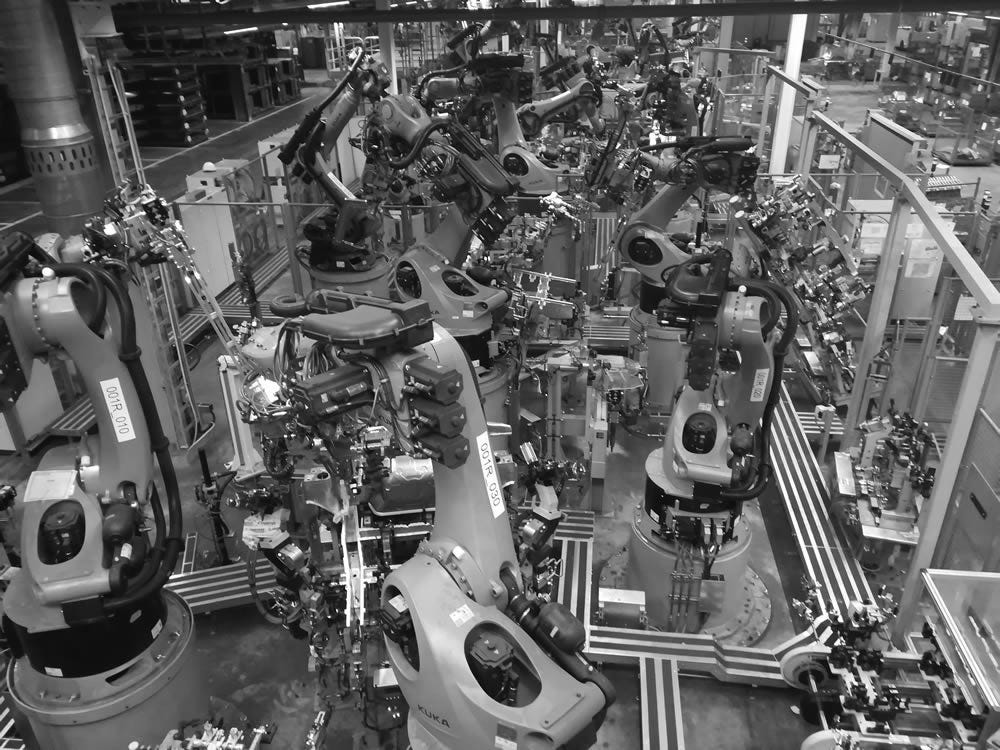I didn’t intend for this post to be about artificial intelligence. Rather, given the recent interest by the Executive Branch of the United States Government in having large military parades on the streets of Washington, DC, to celebrate politicians’ birthdays and national anniversaries, I planned to do some cautionary writing about armies and nations. It was going to be a “be careful what you wish for” tale.
I planned to write an essay about how a single standing army under a unified United States of America prevented the hazard of continuous war that was commonplace among smaller, semi-independent European states seeking to expand territory and hegemony. I intended to compare the absence of interstate war in the United States – with the exception of the American Civil War – to the near-constant warring among the numerous independent kingdoms, principalities, duchies, and city-states that existed in central Europe before the unification of Germany and Italy in the late 19th century. I was going to conclude that while unification has benefits, unified nations with large standing armies have a habit of becoming imperial. I was going to mention Federalist Paper #8, the paper published in 1787 by Alexander Hamilton under the pen-name Publius, which provided justification for a national standing army controlled by the United States federal government.
So I did, sort of. However, my efforts took a surprising twist into a significant controversy surrounding artificial intelligence. I’ll get to the twist in a moment, but first, here’s the essay:
+++++++++++++
The benefit of a standing army in a unified nation
The United States' evolution from a confederation without a standing army to a global military power mirrors the processes that enabled German and Italian unification and subsequent imperial expansion. This transformation began with the military limitations of the Articles of Confederation and culminated in the creation of the world's most formidable fighting force.
Under the Articles of Confederation (1781), America deliberately constrained federal military authority. Congress could declare war but relied on state requisitions for troops—requests states frequently ignored. This system proved dangerously inadequate during Shays' Rebellion (1786-1787), when the federal government lacked authority and means to raise troops against armed Massachusetts farmers protesting taxation.
Alexander Hamilton, in Federalist Paper #8, warned that without a federal military, American states would inevitably mirror Europe's pattern of destructive interstate warfare. He argued that individual states would build defensive armies, leading to militarization and eventual conflict: "The military establishments in the several states would be a source of strength and security to some against the rest." Hamilton predicted that without centralized military authority, America would experience the same interstate conflicts that had plagued pre-unification Germany and Italy for centuries.
The Constitution of 1787 addressed these deficiencies by dramatically expanding federal military authority. It granted Congress power "to raise and support Armies" and "to provide and maintain a Navy," while establishing the President as Commander-in-Chief. Though initial military development was modest—the first regular army in 1789 numbered just 1,216 men—critical institutions like the United States Military Academy (1802) emerged, creating a professional officer corps that transcended state loyalties.
From army to empire
The Civil War (1861-1865) represented the decisive transformation of American military power. The Union Army expanded from 16,000 to over one million soldiers, requiring unprecedented administrative and industrial coordination. Ironically, this conflict represented exactly what Hamilton had warned against in Federalist #8. Nevertheless, the Union's victory established federal military supremacy over state forces—precisely the outcome Hamilton had advocated to prevent such conflicts.
This process paralleled developments in Germany and Italy, where military institutions became vehicles for national identity formation. Just as Prussia's military became the foundation for a unified German military, the Union Army unified disparate northern states into a coherent national entity.
America's consolidated military power enabled imperial ambitions by the late 19th century. The Spanish-American War (1898) brought territorial acquisitions including the Philippines, Puerto Rico, and Guam. The subsequent Philippine-American War required approximately 126,000 American soldiers to suppress independence movements. Military bases established in these territories extended American power projection globally.
Hamilton's vision in Federalist #8 had come full circle—the national military he advocated to prevent interstate warfare had evolved into an instrument of imperial power. Like the military unifications of Germany and Italy that enabled their colonial ambitions, America's consolidated military authority under the Constitution facilitated its emergence as a global imperial power.
Pax Americana
Since 1945 and the fall of the Soviet Union in 1989, the United States has been the preeminent military power of the planet, and since 1945, there has been no major war on a global scale, mostly because the United States military has been able to impose control over global waterways and airspace. Hamilton’s justification for a national standing army has led over the centuries to what has been called the Pax Americana: One army, one planet, and one peace ensured by the United States of America. It may not be what he intended, but such is Hamilton’s legacy.
+++++++++++++
Now, here’s the twist
If I may say so myself, the essay above is not too bad. It’s accurate, engaging, and informative. The only problem is that, except for the heading titles, the illustration, and the last paragraph, I didn’t write it. Claude.ai did. I just gave the AI service the following prompt…
Write a 500-word essay that describes the transformation of the USA from a nation without a standing army under the Articles of Confederation to one with an Army under the Constitution and how, like the unification of the German and Italian states, it led to enough military might to create an empire. Also, relate Federalist Paper #8 to the theme.
… and Claude.ai did the rest.
The result is both surprisingly good and terrifying. AI accomplished in 15 minutes what usually takes me days of writing and revision. And, when it comes time for me to make the audio version of this post, I’ll use the ElevenLabs service, which will narrate this text using a cloned version of my voice.
The savings in time and labor are too significant to ignore, and believe me, the captains of commerce haven’t.
The long-range impact is profound.
My thinking is that in the not-too-distant future, the digital world in all its forms will be controlled by AI, with a few humans pulling whatever strings are available to be pulled. It’s only a matter of time before AI merges with robots that have a high degree of finely integrated visual and motor skills, skills akin to the advanced level of eye-hand coordination found in surgeons and concert pianists. Once this happens, there’s a good chance that human labor will become obsolete. Autonomous thinking machines operating at high speeds, with super-human strength and dexterity, will proliferate and take over all the work previously done by humans, everything from writing complex merger and acquisition contracts to manufacturing nuclear power plants.
What will happen, then? What will the average human need when there is no longer any job to go to? What will organize their lives into somewhat predictable days and fuel their future ambitions? Will humans be born into a life of playing virtual reality games by day and watching infinite content by night until the Grim Reaper comes to collect his due or DoorDash gets the word to stop delivering their daily meals? Or will humans be born at all? The machines won't need us. We’ll become unproductive overhead, not worth the cost of support. Our time may very well be up.
Given this possible future, the question I have is this: Is anybody in power giving serious thought to what humans are going to do when AI and AI-powered robots do all that needs to be done? I hope they are because if they’re not thinking it through to try to come to terms with a world in which work goes away, we're poop out of luck and the machines won't mind at all.






I thoought about this issue a few years ago and stumbled onto https://basicincome.org/ - money for people to live when there's no jobs to pay them. I probably should've dove into this full bore because our tech market is drying up. AI doesn't pay for articles, it just hoovers them.
I will read the Kurzweil piece. Thanks for the comment.